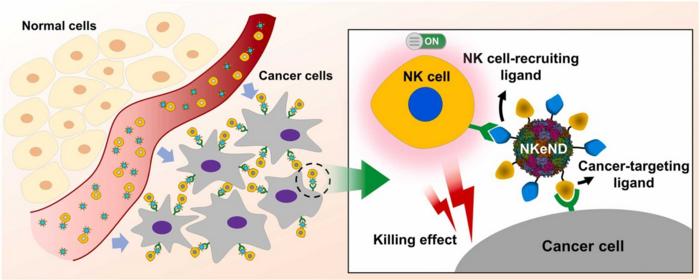
Two cameras record a psychotherapy session. The AI analyses the video sequences. (Image zvg)
Artificial intelligence (AI) can reliably detect emotions based on facial expressions in psychotherapeutic situations. These are the findings of a feasibility study by researchers from the Faculty of Psychology and the University Psychiatric Clinics (UPK) at the University of Basel. The AI system is also able to reliably predict therapeutic success in patients with borderline personality pathology.
The face is a mirror for a person’s emotional state. The interpretation of facial expressions as part of psychotherapy or psychotherapeutic research, for example, is a very effective way of characterizing how a person is feeling in that particular moment. Back in the 1970s, psychologist Paul Ekmann developed a standardized coding system to assign basic emotions such as happiness, disgust or sadness to a facial expression in an image or video sequence.
“Ekman’s system is very widespread, and represents a standard in psychological emotion research,” says Dr. Martin Steppan, psychologist at the Faculty of Psychology at the University of Basel.
But the process of analyzing and interpreting recorded facial expressions as part of research projects or psychotherapy is extremely time-consuming, which is why psychiatry specialists often use less reliable, indirect methods such as skin conductance measurements, which can also be a measure of emotional arousal.
“We wanted to find out whether AI systems can reliably determine the emotional states of patients in video recordings,” says Martin Steppan, who developed the study together with emeritus Professor Klaus Schmeck, Dr. Ronan Zimmermann and Dr. Lukas Fürer from the UPK. The researchers published their findings in the Psychopathology journal.
No facial expression can escape AI
The researchers used freely available artificial neural networks that were trained in the detection of six basic emotions (happiness, surprise, anger, disgust, sadness and fear) using over 30,000 facial photos. This AI system then analyzed video data from therapy sessions with a total of 23 patients with borderline personality pathology at the Center for Scientific Computing at the University of Basel. The high-performance computer had to process over 950 hours of video recordings for this study.
The results were astonishing: statistical comparisons between the analysis of three trained therapists and the AI system showed a remarkable level of agreement. The AI system assessed the facial expressions as reliably as a human but was also able to detect even the most fleeting of emotions within the millisecond range, such as a brief smile or expression of disgust.
The results were astonishing: statistical comparisons between the analysis of three trained therapists and the AI system showed a remarkable level of agreement. The AI system assessed the facial expressions as reliably as a human but was also able to detect even the most fleeting of emotions within the millisecond range, such as a brief smile or expression of disgust.
These types of micro expressions have the potential to be missed by therapists or may only be perceived subconsciously. The AI system is therefore able to measure fleeting emotions with an increased level of sensitivity compared to trained therapists.
Interpersonal communication is still key
The AI analysis also uncovered something rather unexpected. Patients who demonstrated emotional involvement and smiled at the start of a therapy session went on to cancel their psychotherapy less often than people who seemed emotionally uninvolved with their therapist. This “social” smiling could therefore be a good predictor of therapy success in a person with symptoms of borderline personality pathology.
“We were really surprised to find that relatively simple AI systems can allocate facial expressions to their emotional states so reliably,” says Martin Steppan.
AI could therefore become an important tool in therapy and research. AI systems could be used in the analysis of existing video recordings from research studies in order to detect emotionally relevant moments in a conversation more easily and more directly. This ability could also help support the supervision of psychotherapists.
“Nevertheless, therapeutic work is still primarily about human relationships, and remains a human domain,” says Steppan. “At least for the time being.”
Original Article: Artificial intelligence as therapeutic support
More from: University of Basel
The Latest Updates from Bing News
Go deeper with Bing News on:
AI detecting emotions
- 50% of consumers can detect AI-generated content - here’s how to apply the human touch
One of the most important elements of AI use in 2024 is arguably the human touch. A more recent study we conducted at Bynder shed light on the fact that 50% of consumers could tell the difference ...
- AI voice analysis gives suicide hotline workers an emotional dashboard
An AI model accurately tracks emotions like fear and worry in the voices of crisis line callers, according to new research. The model’s developer hopes it can provide real-time assistance to phone ...
- AI is ‘a new digital species’ that will become ‘infinitely knowledgeable’ with a near-perfect IQ, says Microsoft chief
In an 18 minute discussion about the tech, he predicted that AI will have a "near-perfect IQ" but it'll also have exceptional emotional intelligence too ... suggesting that an AI-powered test could ...
- AI speech analysis may aid in assessing and preventing potential suicides, says researcher
Speech is critical to detecting suicidal ideation and a key to understanding the mental and emotional state of people experiencing it. Suicide hotline counselors are trained to quickly analyze speech ...
- AI speech analysis may aid in assessing and preventing potential suicides, says Concordia PhD candidate Alaa Nfissi
Speech is critical to detecting suicidal ideation and a key to understanding the mental and emotional state of people experiencing it. Suicide hotline counsellors are trained to quickly analyze speech ...
Go deeper with Bing News on:
Emotion detection
- Nicole Kidman's mixed emotions on AFI red carpet amid family drama
While the actress celebrates her career milestone at the AFI awards with Keith Urban and their daughters, the complex dynamics with her Scientology-linked children linger in the background Meanwhile, ...
- Emotion Detection & Vital Sign Check App, Livestream Tracking Tool Announced
Gleenr, a new app that tracks and identifies emotions in videos, has announced a livestream tracking update coming soon, which will allow users to identify temperature, respiration, and other vital ...
- After 20 years, North Jersey memorial to clergy abuse victims still stirs strong emotions
The Morris County memorial is believed to be the first to priest sex abuse survivors in the U.S. Its architects say critics "still don't get it." ...
- Inside Out 2's Cut Emotion Character Proves That Pixar Has Learned A Much Needed Lesson
A "Shame" character was cut from Inside Out 2 due to being "too heavy," proving Pixar has learned from past mistakes. The sequel introduces new complex emotion characters like Anxiety, Envy, and ...
- Emotion Detection and Recognition (EDR) Market Exploring Perspectives How Focus Groups Illuminate Consumer Realities
Emotion Detection and Recognition (EDR) Market is valued approximately at USD 17.1 billion in 2019 and is anticipated to grow with a healthy growth rate of more than 18% over the forecast period ...










